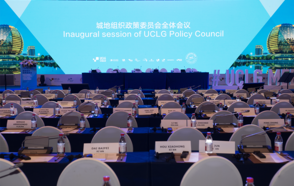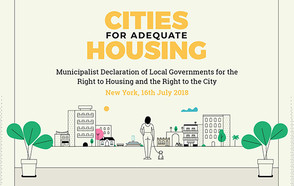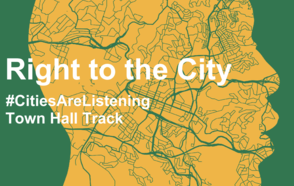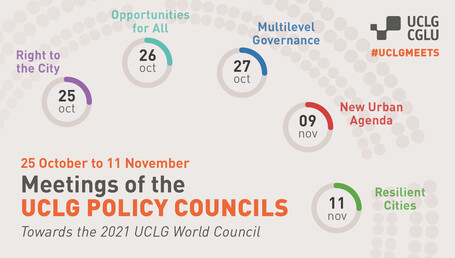
The UCLG Policy Councils are a policy development mechanism of UCLG, led by locally elected leaders that allow for strengthening the political debate of our World Organization and develop policy recommendations in relation to strategic topics
The Policy Council on the Right to the City and Inclusive Territories met in the framework of the Urban October to build upon the topics identified in 2021
Over 70 participants, including the mayors of Ouagadougou, Grigny, Sala, Lampedusa, Libreville, Begur, the deputy mayor of Sfax and representatives from Montevideo and Bogotá brought to the table the need to develop intergenerational cities, the importance of designing cities for all for all that care for the more vulnerable communities, including the elderly and people with disabilities, and showed the more human dimension of UCLG with references to the Lampedusa Charter to reframe human mobility, developing alternatives to detention, and developing cities of peace by fostering non-violence.
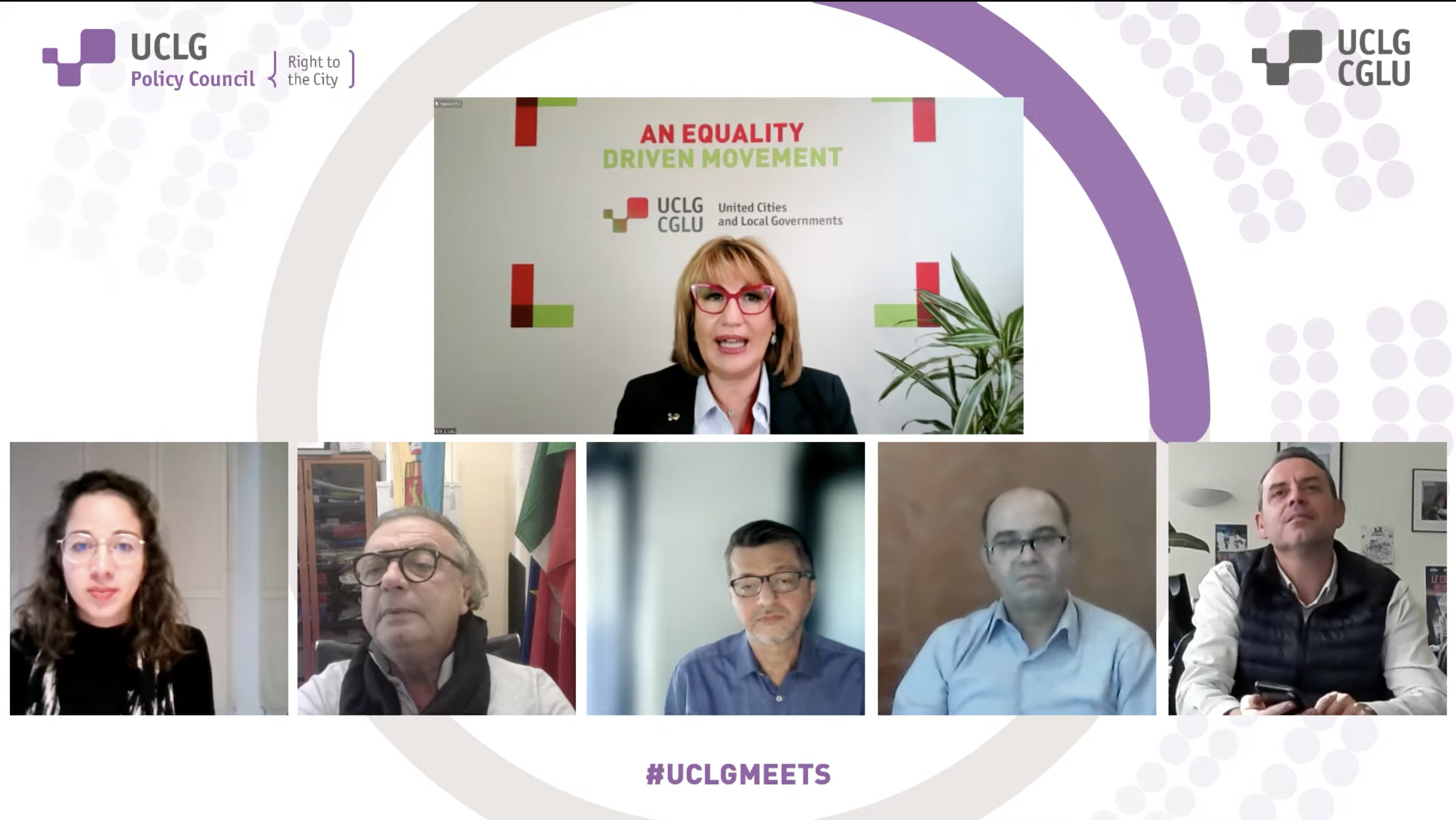
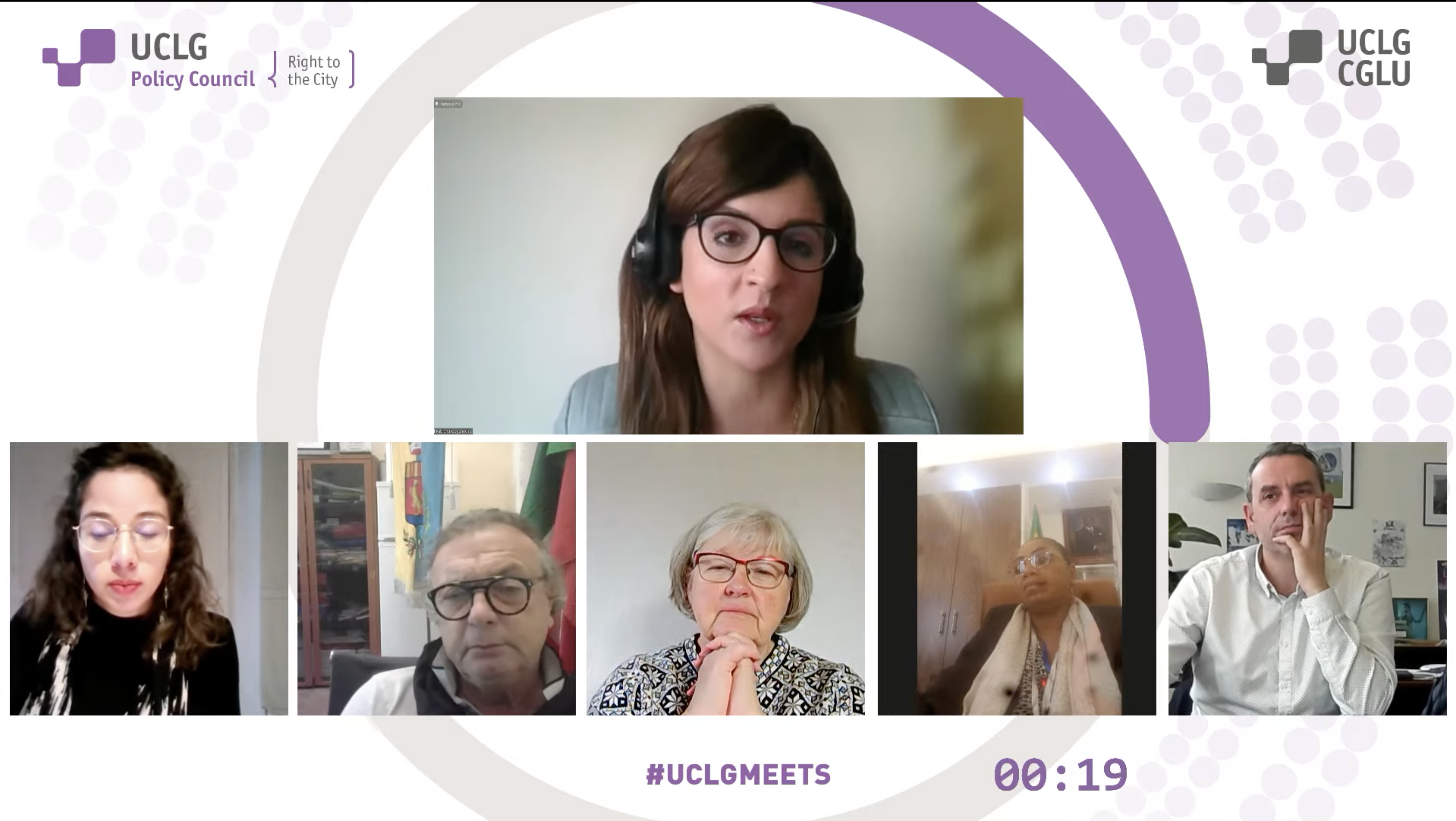
Partners from the Civil Society Action Committee, the Office of the UN Special Envoy on Disability and Accessibility, and the Office of the UN High Commissioner for Human Rights joined the conversation and the calls from the political leadership of the Council, and their inputs will be essential for the development of the Town Hall, as we move towards the 2022 UCLG World Congress.
The Policy Councils will continue to be held during the week, with the Policy Council on Opportunities for All, Culture, and City Diplomacy set to expand on the World Organization’s agenda on peace and equality, and bringing to the table partners to debate the importance of digital accessibility to ensure equal opportunities.
The role of city cooperation in peacebuilding, a critical highlight of the Policy Council on Opportunities for All, Culture, and City Diplomacy
The Policy Council on Opportunities for all, Culture and City Diplomacy met in the framework of Urban October and introduced critical topics for the development of the UCLG Pact for the Future, building on previous meetings held in early 2021.
The meeting gathered over 80 participants and featured the contributions of the Mayor of Valongo, the President of the Aude Provincial County and representatives from Bilbao, the Association of Palestinian Local Authorities (APLA), Izmir, Xi’an and Tirana, together with partners from the Cities Coalition for Digital Rights and the International Federation of Libraries and Associations (IFLA), represented by the libraries of Helsingborg and Toronto.
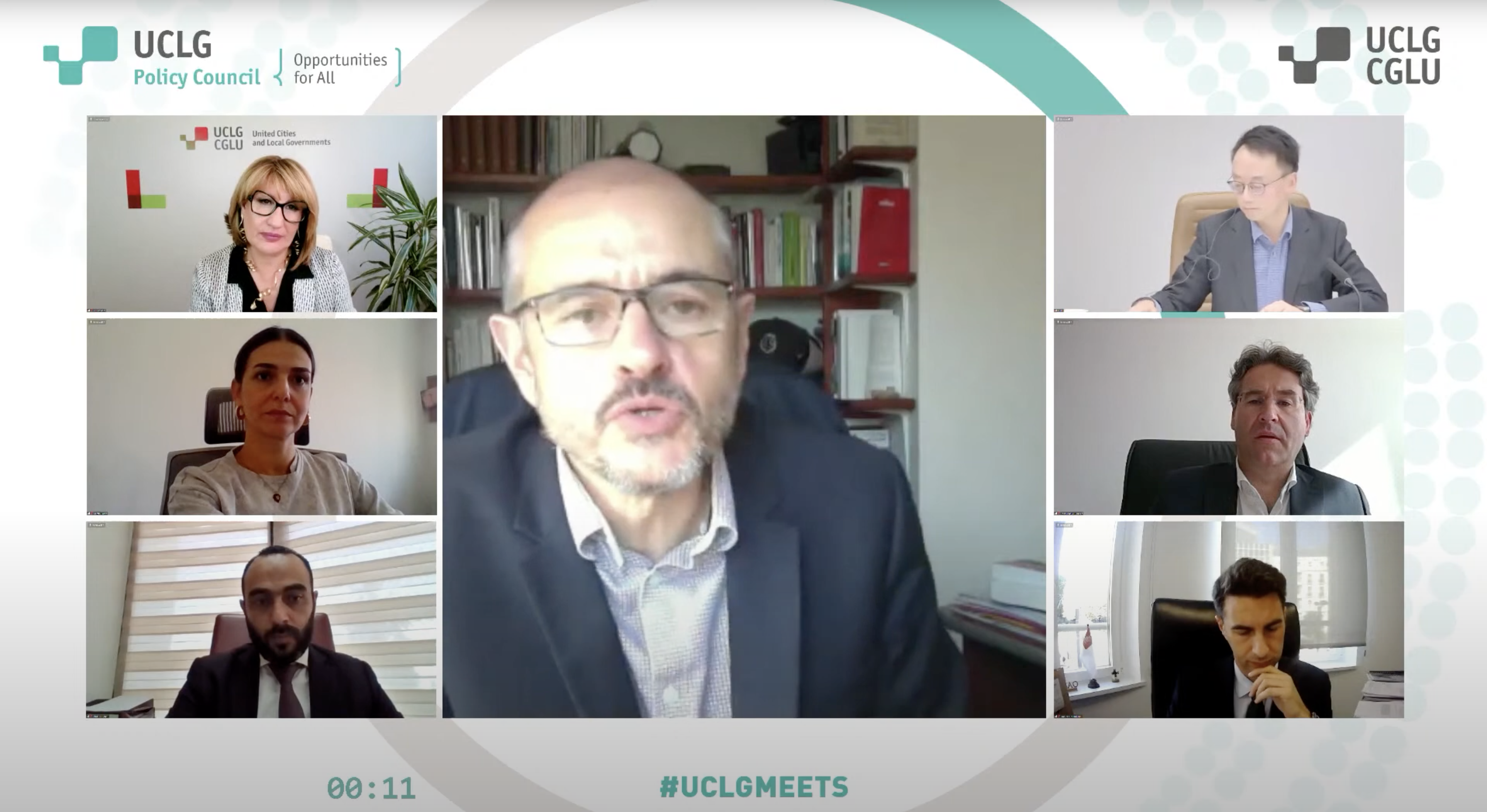
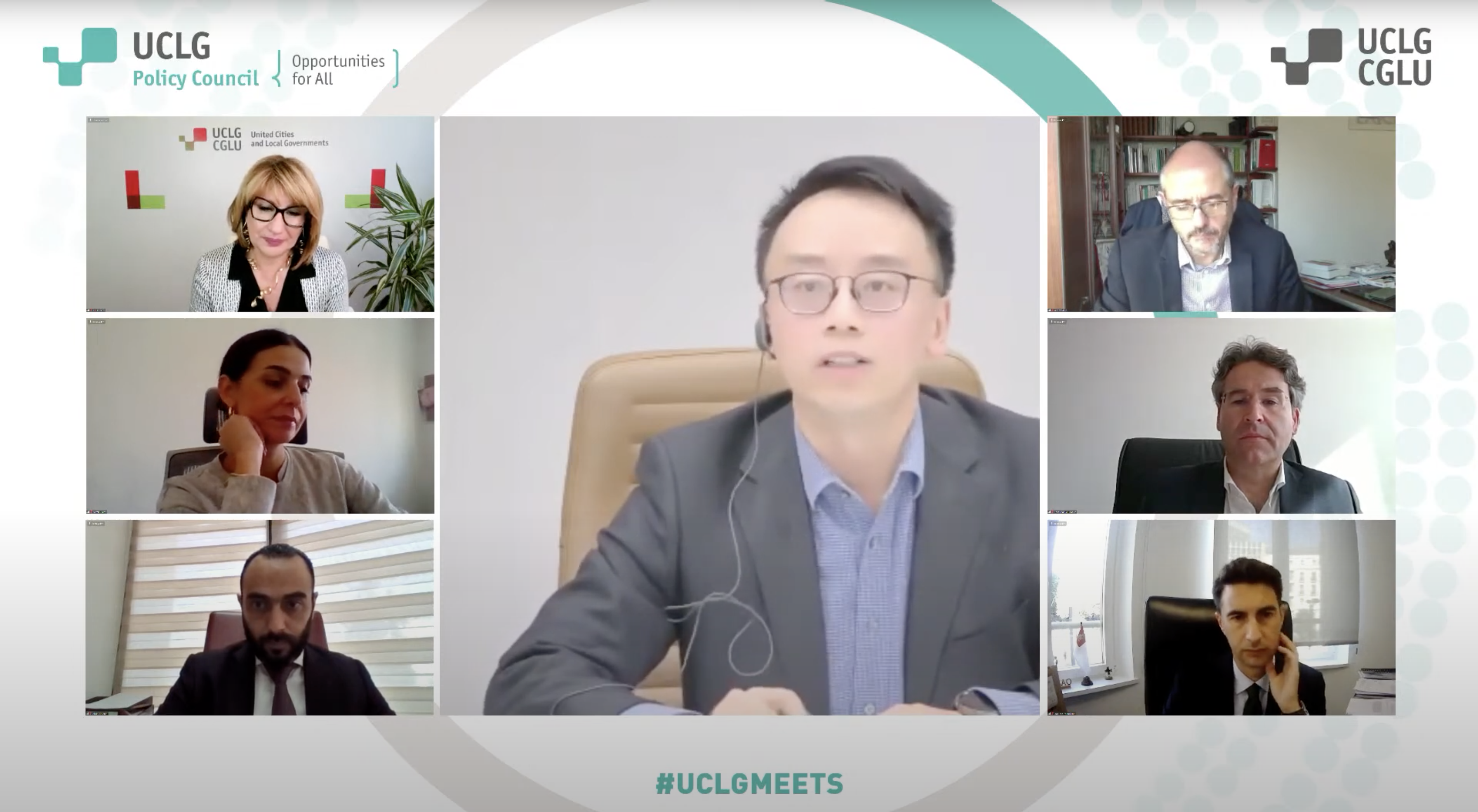
The session revolved around the issues of solidarity in connection to international action and to development cooperation, as well as city diplomacy as vital for peacebuilding, based on values and dialogue between different spheres of government. Participants also deepened the challenge of loneliness in relation to the use of public space, digital accessibility to ensure equal opportunities, and the new concept of “circular culture” included in the Izmir Declaration to protect rights and trigger society building in harmony with nature.
The meeting also provided insights on the interlinkages with the work of other Policy Councils, such as “Safer, Resilient and Sustainable Cities, Capable of Facing Crises”, and “Territorial Multilevel Governance and Sustainable Financing”. The meetings of the rest of the Policy Councils will continue to be held during the week, with the Policy Council on Territorial Multilevel Governance taking place on October 27, and in November.
Working towards a symbiotic relationship between spheres of government at the UCLG Policy Council on Multilevel Governance and Sustainable Financing
The Policy Council on Multilevel Governance and Sustainable Financing met in the framework of Urban October and introduced critical topics for the development of the UCLG Pact for the Future, building on previous meetings held in early 2021.
Moderated by the Head of the Brussels Office from COSLA, the meeting gathered over 70 participants and featured the contributions of the Mayors of Santa Fe, Dori, and Strathroy-Caradoc, as well as the deputy mayor of Angers, and councillors from Madrid and Keçiören. The partners of the session included representatives from the Open Government Partnership, the French Development Agency, and the Canadian Union of Public Employees, as well as representatives of the policy councillors from the Barcelona Provincial Council and the Association of Catalan Municipalities.
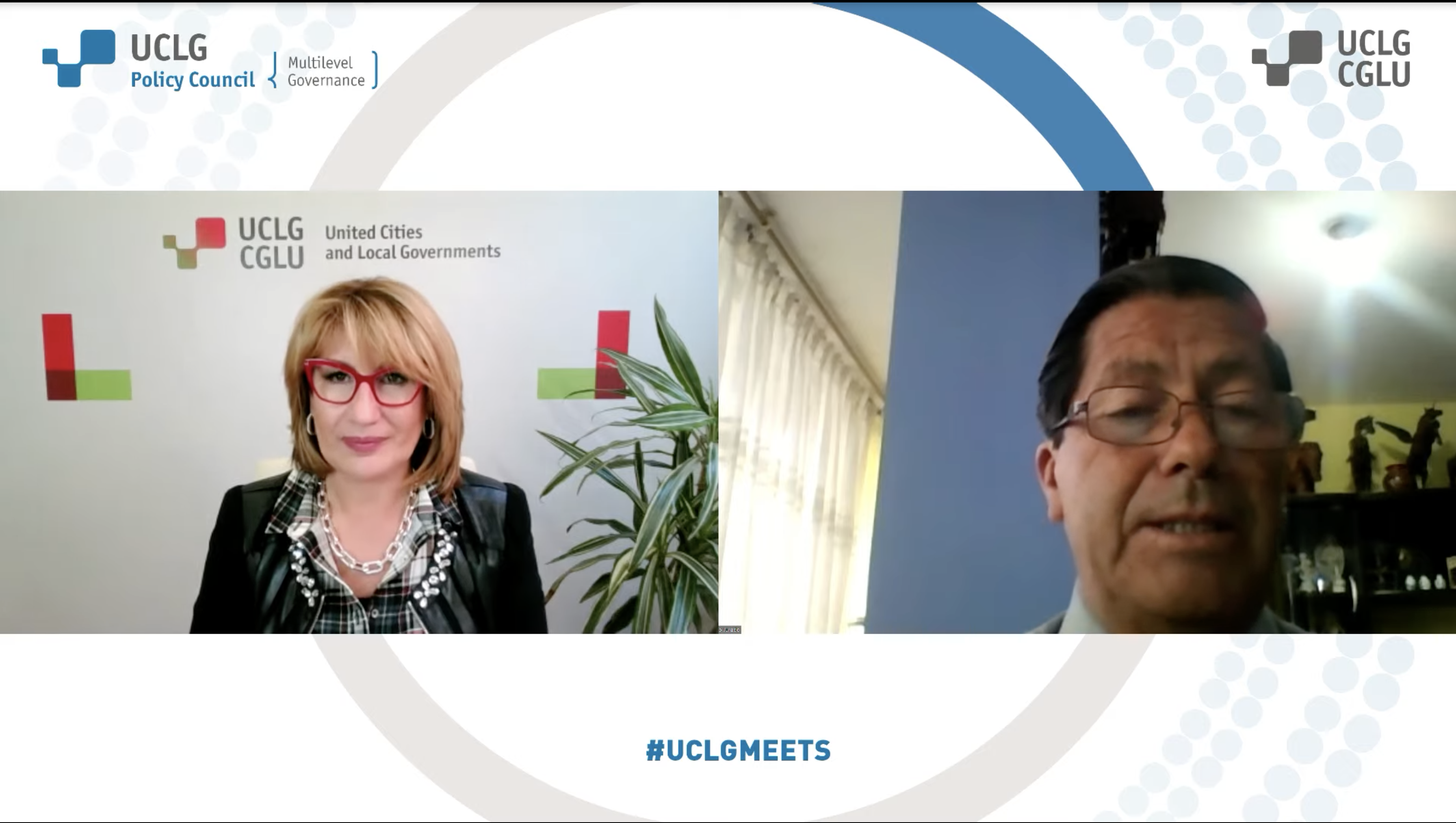
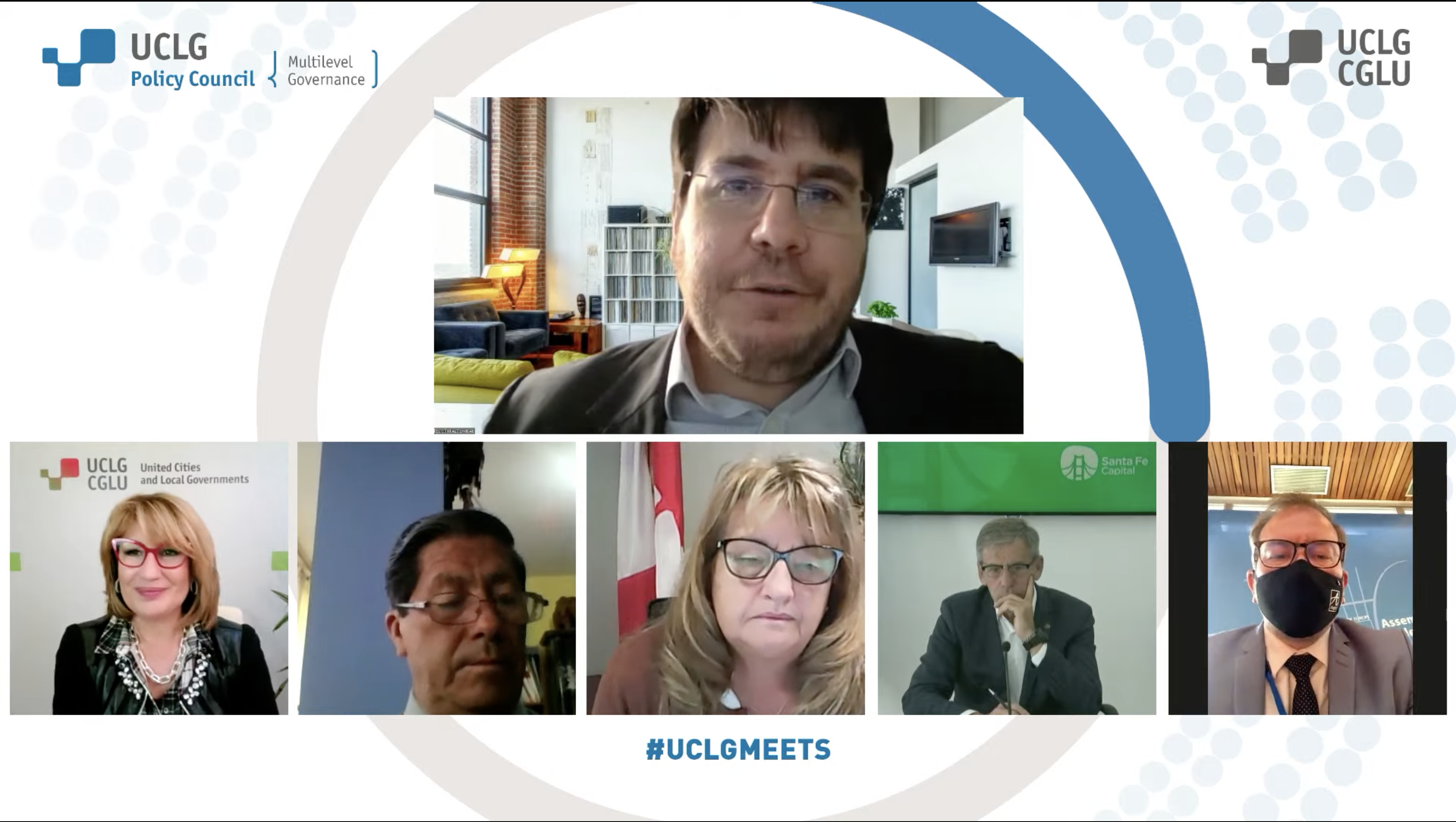
The President of CONGOPE and Vice President of UCLG for the Forum of Regions introduced the conversation highlighting the impact of the pandemic on local finances, and the convening role that LRGs should play in bringing together all actors to transform governance models, and ensure that they are reshaped for a better future.
The session tackled the need to ensure financial resources for local and regional governments which had suffered greatly under COVID-19 and how this could be achieved. The need to develop a broad consensus among spheres of government, empowering cities and territories to act and play a role in solving crises at the local level such as climate change, homelessness and lack of access to basic services; and a commitment to work among all spheres of government and with all actors were some of the key issues identified during the session. Participants also identified critical links with the other Policy Councils, in particular that of Opportunities for All, Culture, and City Diplomacy, highlighting the intrinsic relation between multilevel governance and development cooperation.
Partners identified the need for a multistakeholder response to the COVID-19 crisis, in particular with civil society. Participants also highlighted the need for financing to reach intermediary and smaller cities in order to continue providing critical infrastructure for basic services, and to renew tax frameworks to ensure a fairer distribution of wealth and a healthier service delivery environment.
The meetings of the rest of the Policy Councils will continue to be held in November, with the Policy Council on Safer, Resilient and Sustainable Cities, Capable of Facing Crises taking place on November 11, in the framework of the Local and Regional Governments Day in COP 26; and a session titled “Territorial and Urban Systems”, co-organized by the Policy Council on the Implementation of the New Urban Agenda in the framework of the Metropolis Congress, on November 9.
The UCLG Policy Council on Implementing the New Urban Agenda meets at the Joint Metropolis UCLG session on Territorial and Urban Systems at the Metropolis World Congress
The Policy Council on Implementing the New Urban Agenda (NUA) met in the framework of the Metropolis World Congress and introduced critical topics for the development of the UCLG Pact for the Future, building on previous meetings held in early 2021.
The session kicked off with remarks from UCLG Secretary General who underlined that achieving the New Urban Agenda is an accelerator of the achievement of the 2030 agenda and that the discussions of this policy council meeting will feed into the UN high-level meeting on the review and implementation of the NUA scheduled to take place in April, 2022.
The session gathered speakers and participants from around the world and featured the contributions of the Mayor of Soria and Envoy of the UCLG Presidency for the New Urban Agenda, Mayor of Kazan and President of UNACLA, Mayors of Kitchener and Huelva, the Co-President of UCLG and former Mayor of Polokwane, now Deputy Minister of South-Africa of Cooperative Governance and Traditional Affairs of South-Africa, as well as the Deputy Secretary General of the Guangzhou Municipal Government and the Director General of Digitalization and the Urban Agenda of the Government of Catalonia.
The co-chairs of the policy council kicked off the discussion highlighting the importance of the New Urban Agenda not only in achieving sustainable development but in accelerating action to achieve other global agendas. In this regard the Mayor of Soria and Envoy of the UCLG Presidency for the New Urban Agenda highlighted that “the essence of the New Urban Agenda is based on balanced development which takes into account small towns and intermediary cities and that follows models of proximity production and consumption” while Mayor of Kazan and President of UNACLA underlined the crucial role planning has in protecting people and the planet noting that digital tools and targeted financing could be accelerators of the implementation of the NUA. Co-President of UCLG and former Mayor of Polokwane, now Deputy Minister of Cooperative Governance and Traditional Affairs of South-Africa, reminded all of the importance of multilevel governance within international policy processes highlighting that the NUA can only be achieved through partnership amongst all spheres of government.
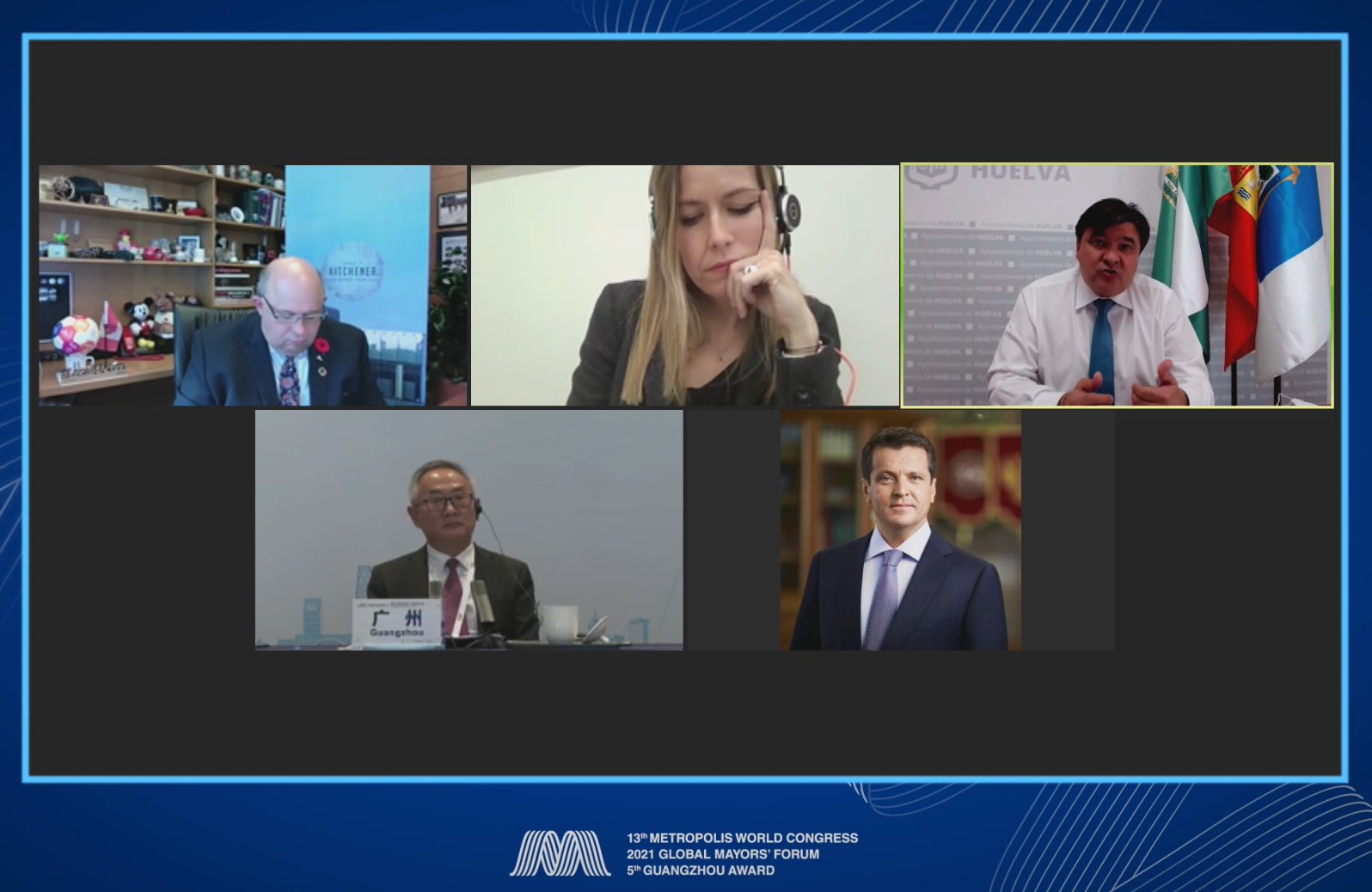
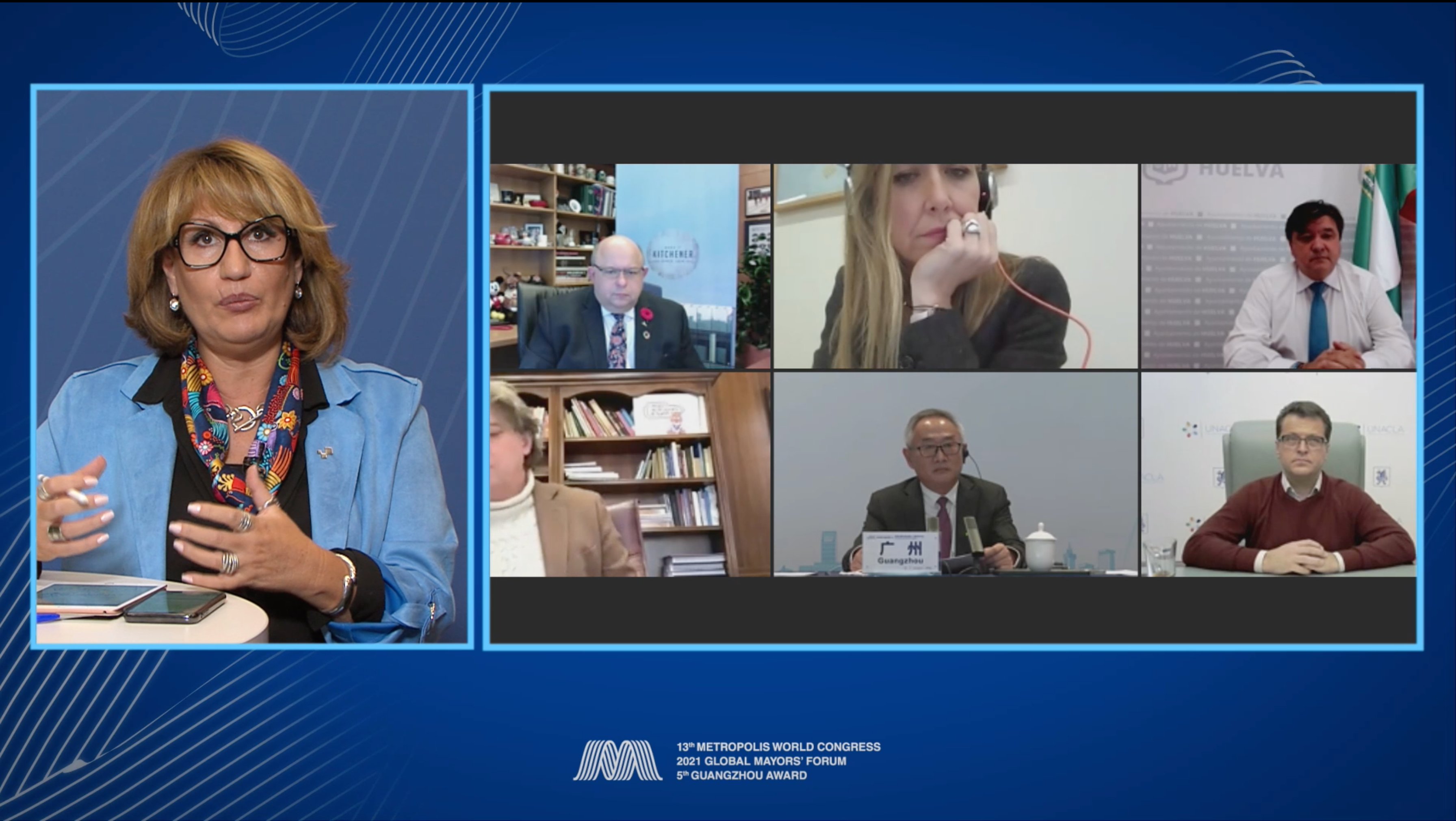
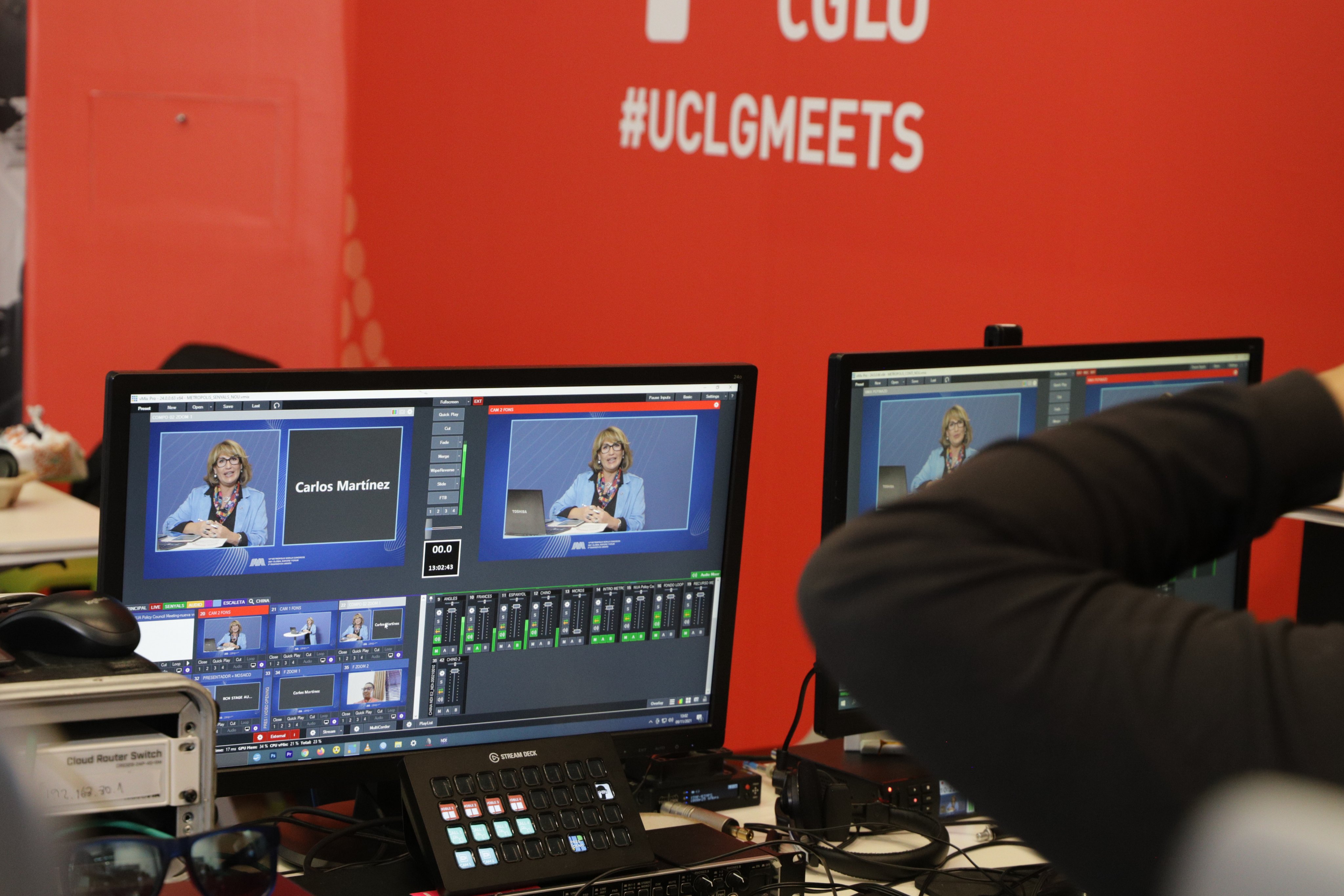
The session tackled the need to ensure local and regional governments are included in the review and follow up of the New Urban Agenda. The need to acknowledge the role public space and urban planning have in increasing the quality of life of people; the relationship between culture and sustainable development and the importance of whole of society approaches and accurate data in the achievement of the global agendas. Participants also identified critical links with the other Policy Councils, in particular that of Multilevel Governance and Sustainable Financing.
The Metropolis Secretary General wrapped up the session by noting that international fora to amplify the voices of local and regional governments such as the Metropolis World Congress and consultation mechanisms such as the UCLG Policy Council are key to ensure that we recover from the pandemic in an inclusive manner. He underlined that a key takeaway from the session was that only through partnership can we achieve territorial and urban resilience and development and implement the NUA.
The meetings of the Policy Councils will continue to be held in November, with the Policy Council on Safer, Resilient and Sustainable Cities, Capable of Facing Crises taking place on November 11, in the framework of the Local and Regional Governments Day in COP 26.
The UCLG Policy Council on Safer, Resilient and Sustainable Cities, Capable of Facing Crises took place on November 11, in the framework of the Local and Regional Governments Day in COP 26
During the Local and Regional Governments` (LRGs) day of the COP26, UCLG held the meeting of the Policy Council on Safer, Resilient and Sustainable Cities, Capable of Facing Crises. The LRGs Day was organized by the LGMA constituency with the support of the Global Taskforce and gathered local and regional government leaders and partners to call on the acceleration of climate and multi-level action.
In the morning, UCLG joined a delegation of LRG in a closed meeting with Antonio Guterres, United Nations Secretary General, who called for strengthening the institutional relationship and partnership between LRGs & the UN System, especially with a view to the UNFCCC COP27 in Egypt and the UN Common Agenda.
The LRG day followed with an in-person session in Glasgow, at the LGMA Multi-level Action Pavillion in the Blue Zone, organized by COSLA together with UCLG, CEMR, LGA, NILGA, WLGA, AICCRE with the support of ICLEI. Representatives of Scotland, Buenos Aires, Budapest, Tours, Paris or Turku, emphasized how the success of the Paris Agreement and climate action relies on local action, city-to-city cooperation and policies regarding energy, the gendered impacts of climate change and much more.
The Policy Council met virtually in the afternoon, gathering over 80 participants from all around the world and delegates connected from COP26 in Glasgow to address critical topics such as global climate emergency and the role of culture, urban poverty, food systems and security, sustainable tourism, local service provision, inclusive societies and culture dimension. After the introduction by the Co-Chair of the Policy Council, representing Geneva, contributions included inputs from the Republic of Sakha, Soest, Montreal, New Taipei City Government, UNEP, Cities Alliance, Association of Friends of the Universal Declaration of Humankind Rights, Climate Heritage Network, UCCI, facilitation by COSLA.
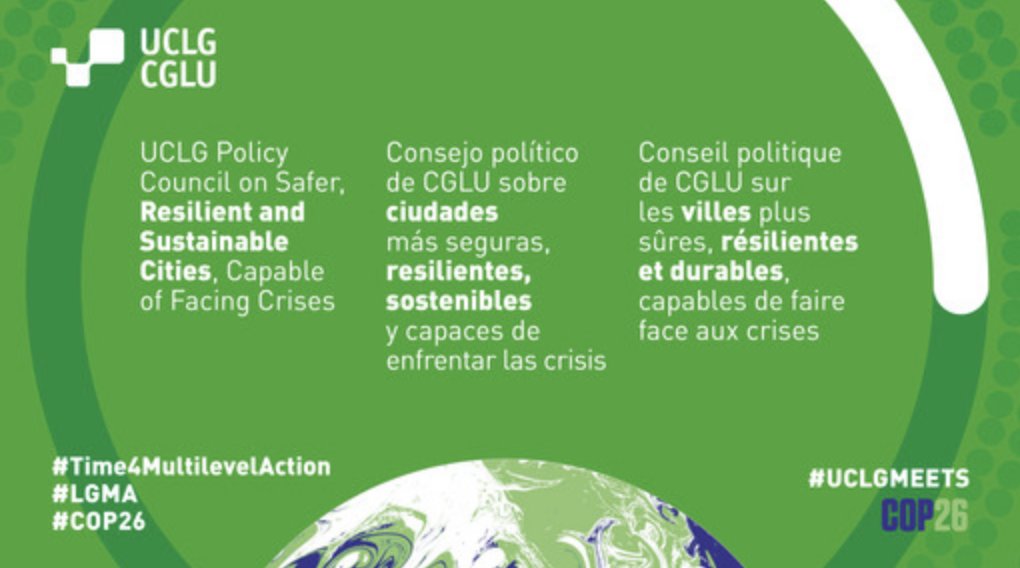
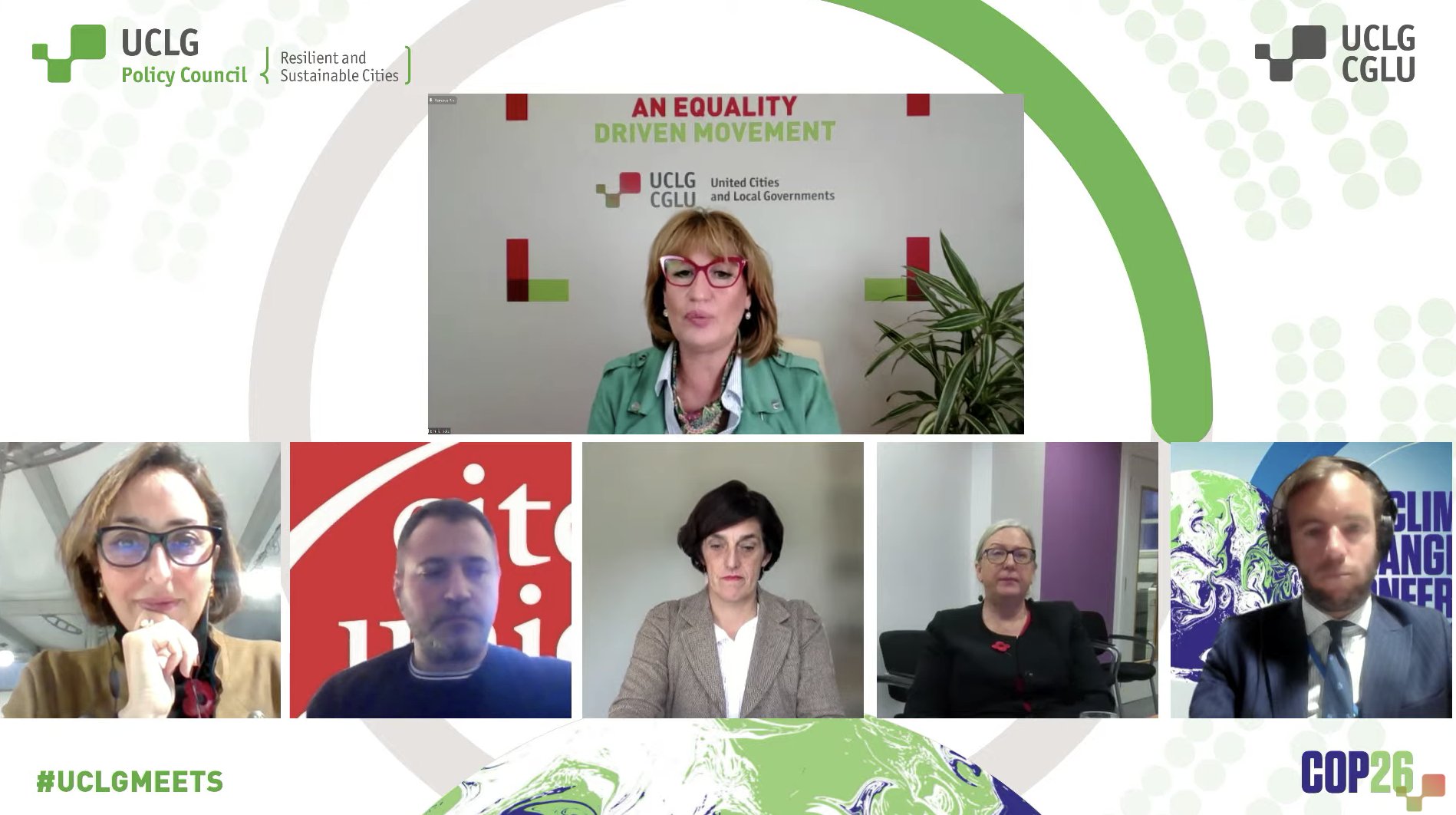
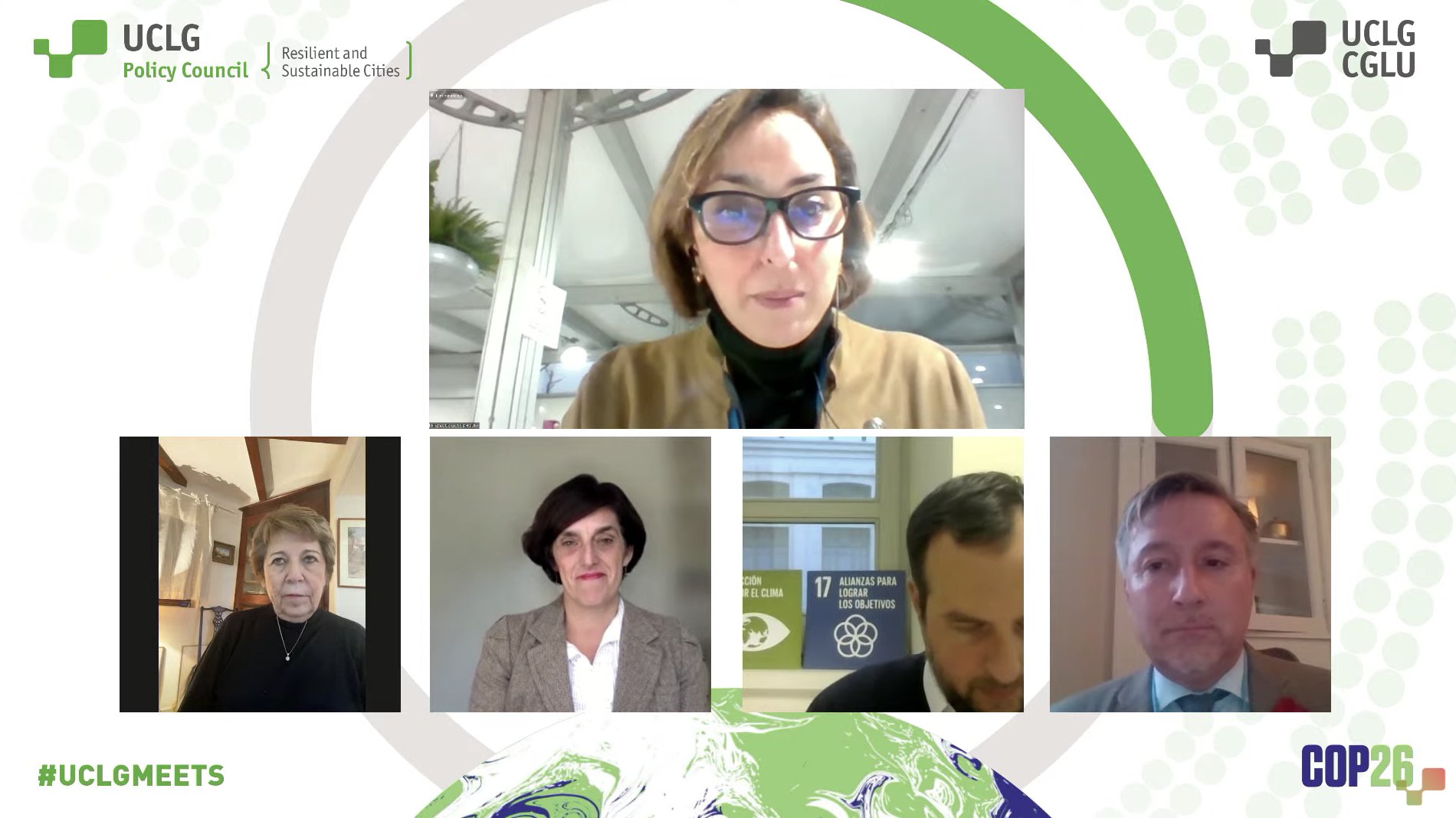
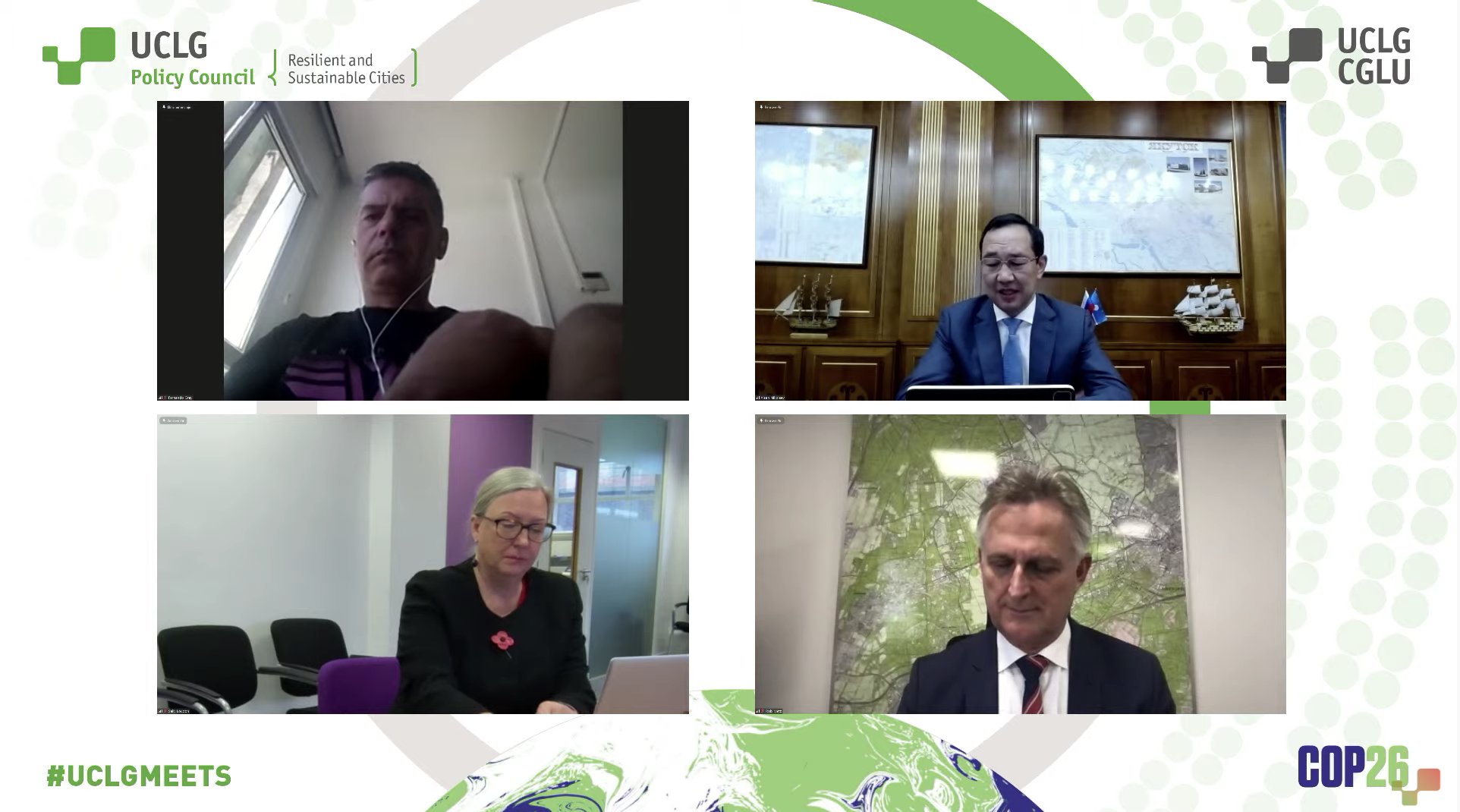
Throughout the meeting, it was stressed the need to consider resilience across different agendas and multilateral processes, connecting with the Voluntary Local Reviews of SDGs, and the upcoming Stockholm+50, which will count with active participation of LRG. Resilience and preparedness to crises will be a driving element to address informality and to achieve territorial equality, in urban, rural and arctic areas, for current and future generations.
This session concluded the series of meetings of Policy Councils preparing the political and policy debates of the UCLG World Council taking place next week, 16-18 November, during the Smart City Expo World Congress in Barcelona.
- Find the background information for the session on UCLGMeets and to read the concept notes.











